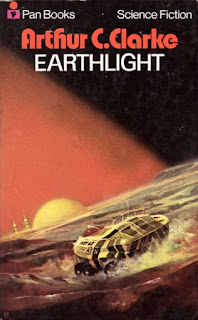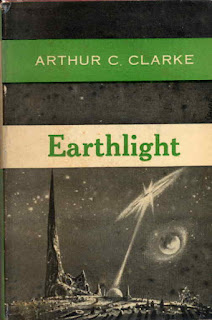Earthlight was Arthur C. Clarke’s sixth science fiction novel. It was published in 1955 but had begun life as a novella four years earlier.
The story takes place a couple of centuries into the future. Mars, Venus, Mercury and several of the larger satellites of Jupiter and Saturn are now politically independent of Earth and have formed the Federation. They face a problem however - they are entirely dependent on Earth for a great many absolutely critical resources. This has caused political tensions. The tensions have grown to the point where war seems very likely.
Sadler has just arrived at the Observatory on the Moon. He’s a mild-mannered accounting conducting an audit. At least that’s what he appears to be. In truth he is an agent of Earth’s Central Intelligence. Information has been leaking to the Federation and that information could exacerbate the political tensions and, in the event of war, be very disadvantageous to Earth. The leak seems to originate in the Observatory. Sadler has to find the leak and plug it. Sadler has lots of suspects to choose from but somehow he can’t believe any of them could be spies.
At this very moment there is great excitement at the Lunar Observatory. They have spotted a supernova. This will be the first ever opportunity to study a supernova with the aids of modern science.
There’s also something going on on the lunar surface not far from the Observatory. It’s clearly some hush-hush government project and it seems increasingly likely that it’s a military project.
Political tensions keep mounting and the drift to war, the first war for two hundred years, seems inevitable.
Clarke liked to make his science fiction as scientifically plausible as possible but of course, given that he wrote this book in the early 1950s, Earthlight is based on some mistaken ideas about our solar system. The chances of colonising Venus are close to zero. Even the colonisation of Mars or the Moon would present more formidable challenges. In the early 50s there was less awareness of the dangers that space colonists would face from radiation.
Clarke wasn’t just indifferent to characterisation. He was actively hostile to characterisation. For Clarke science fiction was about ideas. Any focus on the inner lives of the characters would be a fatal distraction. And any hint of a romance plot would be a distraction. Clarke wrote uncompromising pure science fiction. That was his approach and he stuck to it.
This is a book that reflects the boundless optimism of so much science fiction of that era. Our Destiny Lies In The Stars, that sort of thing. And it reflects the even more optimistic view that science and space exploration will solve all human problems. The weakness of this book is Clarke’s political naïvete. The idea that politicians (of all stripes) are motivated by greed, ambition, stupidity, cynicism and ignorance never occurred to him. The idea that the general public might be easily manipulated by greed, fear and ignorance also never occurred to him. He assumes that commonsense and reason will always ultimately prevail. He assumes that scientific progress must go hand-in-hand with an increasingly enlightened and reasonable outlook. It’s his excessive optimism that makes this novel seem hopelessly unworldly and unrealistic.
It’s always amusing to note the things that science fiction authors fail to predict about the future (because the future cannot be predicted). In this world of the mid-22nd century computer technology is still 1950s computer technology. Records are still kept by hand, on paper. Photography is an essential tool of astronomers and photographic technology remains at 1950s levels. This is an analog future.
Stylistically this is typical Clarke. Content-wise it’s radically different from his other books. This is a spy novel, but Clarke doesn’t really understand how to build the mystery and suspense required in a spy story. It’s also a story of war, and it’s odd to find Clarke writing about space battles. The climactic battle scenes are actually handled quite well, with some ingenious super-weapons. There’s also a reasonably well done space rescue.
Clarke’s ideas about what life would be like on the Moon and on planets like Mars, even if based on 1950s knowledge about the solar system, are interesting.
Overall this is not one of Clarke’s finest moments. The problem is not scientific implausibility but an implausible understanding of human nature. Clarke was a very great science fiction writer and Childhood’s End and The City and the Stars are rightly considered classics. Earthlight however is a bit of a misfire.


Not read this, but I think I've read the novella it's based on, in his collection of short stories - that was quite good, mostly about the space battle, but, yeah, there was NO characterisation at all lol
ReplyDeleteThe novella might well be better. The novel's extended spy plot drags, Clarke being not exactly at home trying to write spy fiction.
Delete